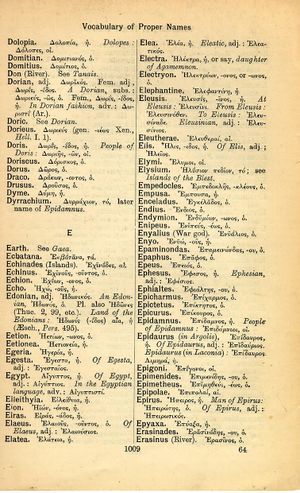Epigoni: Difference between revisions
From LSJ
Ῥᾷον παραινεῖν ἢ παθόντα καρτερεῖν → Patientiam suadere facile, non pati → Es spricht sich leichter zu, als stark zu sein im Leid
(Names) |
(6_6) |
||
| Line 1: | Line 1: | ||
{{WoodhouseENELnames | {{WoodhouseENELnames | ||
|Text=[[File:woodhouse_1009.jpg|thumb|link={{filepath:woodhouse_1009.jpg}}]]Ἐπίγονοι, οἱ. | |Text=[[File:woodhouse_1009.jpg|thumb|link={{filepath:woodhouse_1009.jpg}}]]Ἐπίγονοι, οἱ. | ||
}} | |||
{{Lewis | |||
|lshtext=<b>Ĕpĭgŏni</b>: ōrum, m., = Ἐπίγονοι,<br /><b>I</b> the After-[[born]].<br /><b>I</b> The [[sons]] of the [[seven]] heroes [[who]] went [[together]] [[against]] [[Thebes]], Hyg. Fab. 71; as the [[name]] of a [[tragedy]] of [[Aeschylus]], translated [[into]] Latin by [[Attius]], Cic. Opt. Gen. 6, 18; id. Tusc. 2, 25, 60; id. Off. 1, 31, 114.—<br /><b>II</b> The children of the soldiers of [[Alexander]] the Great by Asiatic women, Just. 12, 4 fin.> | |||
}} | }} | ||
Revision as of 08:30, 13 August 2017
English > Greek (Woodhouse)
Ἐπίγονοι, οἱ.
Latin > English (Lewis & Short)
Ĕpĭgŏni: ōrum, m., = Ἐπίγονοι,
I the After-born.
I The sons of the seven heroes who went together against Thebes, Hyg. Fab. 71; as the name of a tragedy of Aeschylus, translated into Latin by Attius, Cic. Opt. Gen. 6, 18; id. Tusc. 2, 25, 60; id. Off. 1, 31, 114.—
II The children of the soldiers of Alexander the Great by Asiatic women, Just. 12, 4 fin.>

